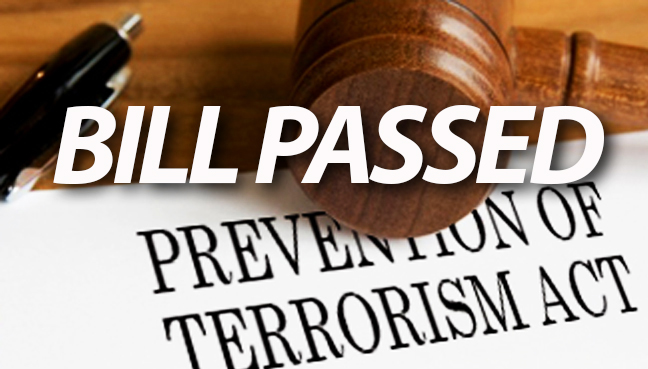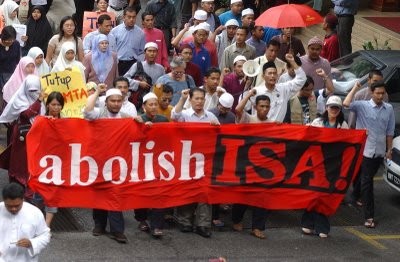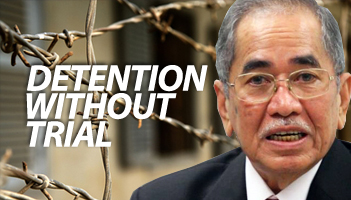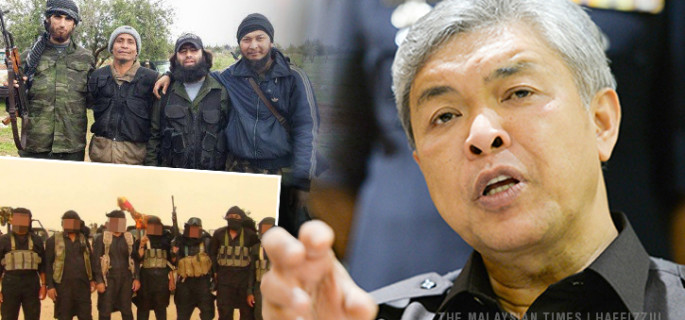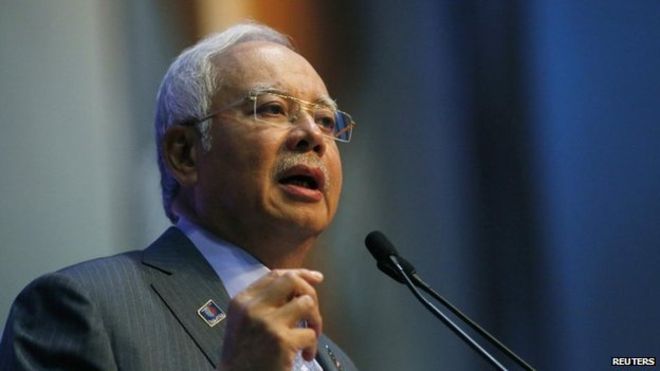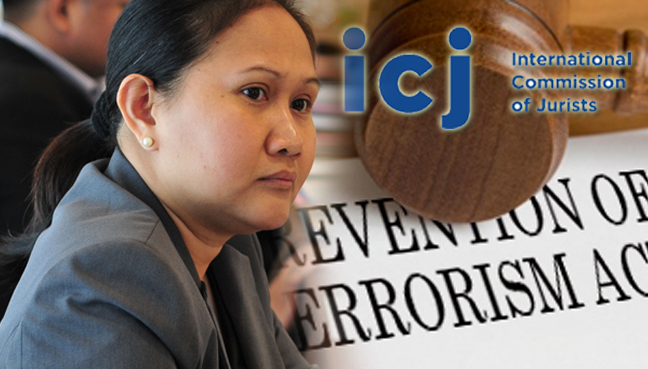16 Things You Need To Know About Malaysia's Controversial New Anti-Terrorism Act POTA
After 15 hours of debate in the Dewan Rakyat till 2.26am, the Prevention Of Terrorism Act 2015 (POTA) has been passed with 79 votes, to the dismay of the 60 lawmakers who are afraid it is a reincarnation of the ISA.
1. POTA, or the Prevention Of Terrorism Act 2015, was tabled following the rise of ISIS and fears of terrorist threats
On Nov 26, 2014, Prime Minister Datuk Seri Najib Tun Razak presented a white paper entitled "Towards Addressing Threats of Islamic State (IS) Groups" in Parliament in acknowledging the continued threat of violence within and outside the country.
The white paper stressed the government's commitment in combating threats posed by IS with the international community. Based on the recommendation in paragraph 59 of the white paper, a new law will be enacted to specifically address the threat of IS.
2. It is meant to crack down on terror threats on the nation and to stop Malaysians from supporting terrorist organisations
The purposes of POTA are:
1. To prevent the conduct or support for acts of violence involving terrorist organization of a foreign country and for the control of persons affected by such act.
2. Ensure that no individual escape legislative action should they engage in terrorism.
3. The Act ensures that the citizens and the country's security are not threatened by those involved in militant activities.
3. Critics fear that POTA is a reincarnation of the draconian Internal Security Act (ISA) to detain political prisoners
Critics including Kuala Terengganu MP Datuk Raja Kamarul Bahrin Shah Raja Ahmad and Kelana Jaya MP Wong Chen had raised concerns over the new law, saying that it was just a "reincarnation" of the ISA.
N. Surendran also said when the Internal Security Act (ISA) was drafted, it was guaranteed that it would not be misused to detain people for their political beliefs or activities but proved to be otherwise.
thestar.com.my4. Under the proposed law, police can arrest any person without a warrant as long as they suspect the person is involved in terrorist activities
A police officer may without a warrant, arrest any person if he has reason to believe there are reasons that justify an inquiry be held into the case of the person.
When a person is arrested, the case shall be referred by police officers to the public prosecutor for further instructions no later than seven days from the date of arrest.
5. Suspects can be detained for up to two years, which can also be extended indefinitely. There is no guarantee of legal representation for the suspects.
Under the proposed law, suspects can be first detained a maximum of 59 days (including the initial remand period), before being brought to the board, which can then order further detention of up to two years.
Following this, the detention period can be renewed if the board decides there are reasonable grounds. It can also direct a person to be set free if it deemed necessary.
6. Suspects cannot have their case heard in any court as judicial reviews are not allowed. The Prevention of Terrorism Board has the final say.
The bill does not allow any judicial review in any court, noting that no court shall have jurisdiction over decisions by the board in its discretionary power.
7. The Yang di-Pertuan Agong will appoint five to eight people to chair the Prevention of Terrorism Board. They have the power to decide the detention order of suspects.
The bill also stated the establishment of the Prevention of Terrorism Board which consists of chairman, deputy chairman and not less than three, and not more than six other members, appointed by the Yang di-Pertuan Agong.
The board, if it is satisfied that it is necessary in the interest of the country's security, could issue a detention order for the person to a two-year period in a place of detention; or may issue a restriction order and the person shall be subject to police supervision for a five-year period.
8. Suspects released under a restriction order could be asked to wear an electronic monitoring device and will be under police survelleilance
On those detained under the restriction order, the board could instruct that the detainees be attached with an electronic monitoring device.
9. The decision of the Board cannot be challenged unless on procedural matters
“Although POTA states that no person shall be arrested for their political beliefs or activities, it also states that the decision of the Prevention of Terrorism Board cannot be challenged unless it is on procedural matters,” Surendran added.
thestar.com.my10. The Home Minister will appoint Inquiry Officers with powers to do as they see fit during the course of an investigation
The Home Minister will appoint Inquiry Officers to inquire and report to the board on the suspected person, and, no police officer can be appointed as inquiry officer.
According to this [article (http://www.themalaymailonline.com/opinion/khairie-hisyam-aliman/article/five-reasons-why-pota-is-scary), The powers proposed to be bestowed upon the Inquiry Officer by the Bill are powerful and plenty. It empowers the Inquiry Officer to procure evidence by any means he feels necessary during an investigation against a suspect. He may also use his own discretion to demand any document, direction, access to detainee solely based on his opinion.
And the access comes without allowing the suspect or his lawyer or any of his representative to be present when the Inquiry Officer meets with whoever he is demanding access to.
To summarise, the Inquiry Officer under the Prevention of Terrorism Act has wide-ranging powers that borders on legal discretion to do as he sees fit — as long as the Officer believes that it suits the investigation he is pursuing.
11. According to Home Minister Zahid Hamidi, no person shall be arrested based on his or her political belief or activity
The bill, tabled by Home Minister Datuk Seri Dr Ahmad Zahid Hamidi explained 'political belief or political activity' as engaging in a lawful activity through the expression of an opinion or the pursuit of a course of action made according to the tenets of a political party that is at the relevant time registered under the Societies Act 1966.
12. The Home Ministry insists that POTA is totally different from ISA
Deputy Home Minister, Datuk Seri Dr Wan Junaidi Tuanku Wan Jaafar said there were certain provisions in the Pota that differs from the ISA, including its executive powers and power of detention.
"The executive powers are not on the minister, like in the ISA, but it rests on the five-member advisory board," he said when tabling the bill for debate in Parliament today.
"In the ISA previously, the police will decide who to detain but under Pota, only the board is allowed to make such a decision. "As such, criticisms that Pota is the twin of the ISA is baseless, inaccurate and untrue."
13. Najib has given his assurance that POTA would not be used for political purposes
Prime Minister Datuk Seri Najib Razak had also earlier given his assurance that the new law would not be used for political purposes, saying that the executive arm of the government would have no say in whether to detain an individual.
"We will place it under a credible body so that only those truly involved in terrorism can be detained under the new act. That way, we can guarantee Malaysia will continue to be safe," said Najib.
14. The Malaysian Bar has strongly rejected the new law, and pointed out loopholes in the definition of the law that could lead it being abused to silence government oppositions
The Malaysian Bar abhors detention without trial, and views the Prevention of Terrorism Bill 2015 as a repressive law that is an affront to the rule of law and repugnant to the principles of natural justice.
POTA is purportedly directed at persons who are “engaged in the commission or support of terrorist acts involving listed terrorist organisations in a foreign country or any part of a foreign country”. However, because words like “engaged”, “commission”, “support” and “involving” have not been defined in POTA, the reach of the legislation is extremely wide and lends itself to abuse. It opens up the possibility that almost anyone could be targeted under POTA.
One of the most offensive aspects of POTA is its absolute ouster of judicial scrutiny. The Malaysian Bar is concerned that organisations not registered as political parties under the Societies Act 1966, or not registered under the Societies Act 1966 at all, may be subjected to the wide powers of POTA.
15. The International Commission of Jurists says POTA and ISA are disturbingly similar
The International Commission of Jurists, a Geneva-based nongovernment organization of judges and lawyers, last month said it was “disturbing” that the antiterror legislation has similar elements to the Internal Security Act that “was previously used to silence government opposition and curtail freedom of expression in the 1980s.”
wsj.com16. Human Rights Watch says it POTA a "giant step backwards for human rights"
Human Rights Watch Deputy Director Phil Robertson said the new antiterrorism law “is a giant step backward for human rights in Malaysia that fundamentally calls into question the government’s commitment to basic rights that are critical to the rule of law in a functioning democracy.”
wsj.comPhil Robertson of Human Rights Watch said that by "restoring indefinite detention without trial, Malaysia has re-opened Pandora's Box for politically motivated, abusive state actions".
bbc.com